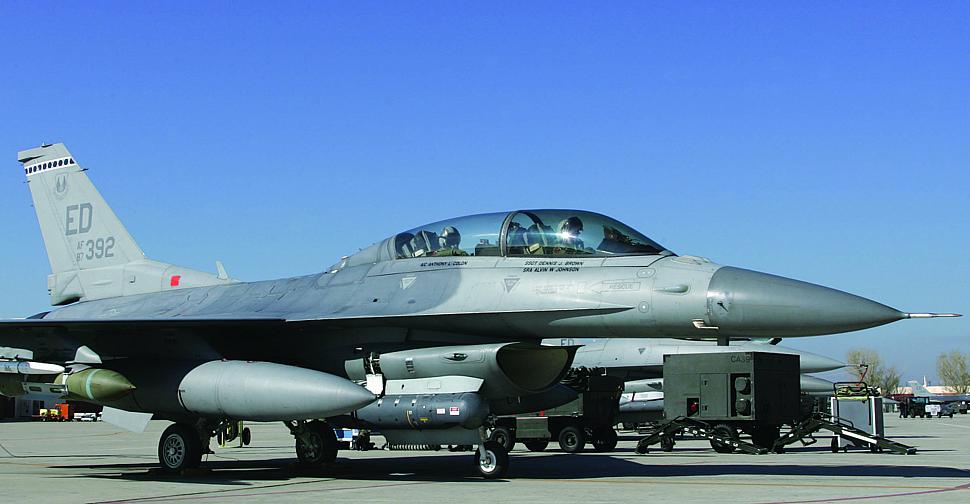Fighter Jet News
F-16 Fighting Falcon News
Dutch F-16s to be equipped with LITENING AT System
November 6, 2006 (by
Lieven Dewitte) -
The Royal Netherlands Air Force today announced the selection of Northrop Grummans third-generation LITENING Advanced Targeting (AT) system for their F-16 Advanced Targeting Pod upgrade program.
Under the terms of the contract, Northrop Grumman will deliver 20 targeting pods and spares to the Royal Netherlands Air Force beginning in 2007, with final deliveries in 2008.
The pod has been selected after a comprehensive, in-depth competitive analysis that reviewed all advanced targeting pods in use by the U.S. Air Force as well as the best foreign advanced targeting system.
To date, over 470 LITENING pods have been ordered by the U.S. Air Force and allied nations. More than 360 of the systems have been fielded, the largest number of any advanced targeting and sensor system. LITENING is combat proven on AV-8B, A-10, B-52, F-15E, F-16 and F/A-18 aircraft. Together, all variants of the LITENING AT pod have amassed approximately 560,000 flight hours, with more than 253,000 of these hours posted in combat arenas.
With this contract award, the Royal Netherlands Air Force joins the U.S. and Royal Australian Air Force, Spanish Air Force and Italian Air Force to enable expanded LITENING AT operational use by coalition forces.
Northrop Grumman's LITENING AT system is a self-contained, multi-sensor weapon aiming system that enables fighter pilots to detect, acquire, auto-track and identify targets for highly accurate delivery of both conventional and precision-guided weapons. LITENING AT features advanced image processing for target identification; coordinate generation for GPS weapons; a 640 x 512 pixel forward-looking infrared sensor for effective day and night operations; a new 1,024 x 1,024 pixel charge-coupled device (1k CCD) television sensor; a new dual waveband infrared laser designator and range finder; a laser spot tracker; an infrared laser marker; and an optional air-to-ground data link and digital video recorder.
Background
The research and development program began at Rafael Corporation's Missiles Division in Haifa, Israel, with subsequent completion of LITENING I for use in the Israeli Air Force. In 1995 Northrop Grumman Corporation's teamed with Rafael for further development and sales of the LITENING pod. Northrup Grumman Corporation completed product improvements on the "Basic Pod" including a third generation FLIR, laser marker and software upgrades (LITENING II) which which was fielded with the Air Reserve components beginning in 1999.
Northrop Grumman subsequently replaced the "256" FLIR with a "512" FLIR. This pod, known as LITENING ER, extended the target detection range and began fielding in 2001. The newest version, LITENING AT, began fielding in 2003. It further extends target detection and recognition ranges, improves the target coordinate generation accuracy, and provides multi-target cueing.
The pod has been selected after a comprehensive, in-depth competitive analysis that reviewed all advanced targeting pods in use by the U.S. Air Force as well as the best foreign advanced targeting system.
To date, over 470 LITENING pods have been ordered by the U.S. Air Force and allied nations. More than 360 of the systems have been fielded, the largest number of any advanced targeting and sensor system. LITENING is combat proven on AV-8B, A-10, B-52, F-15E, F-16 and F/A-18 aircraft. Together, all variants of the LITENING AT pod have amassed approximately 560,000 flight hours, with more than 253,000 of these hours posted in combat arenas.
With this contract award, the Royal Netherlands Air Force joins the U.S. and Royal Australian Air Force, Spanish Air Force and Italian Air Force to enable expanded LITENING AT operational use by coalition forces.
Northrop Grumman's LITENING AT system is a self-contained, multi-sensor weapon aiming system that enables fighter pilots to detect, acquire, auto-track and identify targets for highly accurate delivery of both conventional and precision-guided weapons. LITENING AT features advanced image processing for target identification; coordinate generation for GPS weapons; a 640 x 512 pixel forward-looking infrared sensor for effective day and night operations; a new 1,024 x 1,024 pixel charge-coupled device (1k CCD) television sensor; a new dual waveband infrared laser designator and range finder; a laser spot tracker; an infrared laser marker; and an optional air-to-ground data link and digital video recorder.
Background
The research and development program began at Rafael Corporation's Missiles Division in Haifa, Israel, with subsequent completion of LITENING I for use in the Israeli Air Force. In 1995 Northrop Grumman Corporation's teamed with Rafael for further development and sales of the LITENING pod. Northrup Grumman Corporation completed product improvements on the "Basic Pod" including a third generation FLIR, laser marker and software upgrades (LITENING II) which which was fielded with the Air Reserve components beginning in 1999.
Northrop Grumman subsequently replaced the "256" FLIR with a "512" FLIR. This pod, known as LITENING ER, extended the target detection range and began fielding in 2001. The newest version, LITENING AT, began fielding in 2003. It further extends target detection and recognition ranges, improves the target coordinate generation accuracy, and provides multi-target cueing.
Related articles:
External link:
Forum discussion:
Tags
- Team tests pod at 'LITENING' speed (2006-04-18)
- Dutch F-16s to receive RecceLite reconnaissance pod (2005-12-21)
- Northrop Grumman LITENING Pods Successfully Completes OT&E (2000-02-21)
- LITENING II Targeting Pods demonstrate successful first flights (1999-10-04)
- F-16 Fighting Falcon news archive
External link:
Forum discussion:
- Dutch F-16s to be equipped with LITENING AT System ( 2 replies)
Tags

